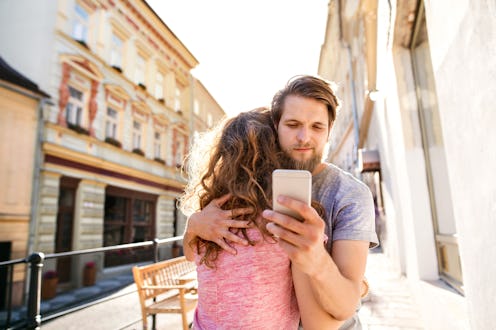
When it comes to bad habits, so many of us are guilty of spending too much time on our phone. And though we may know it's wrong, it's easy to end up "phubbing" other people. Basically, phubbing all boils down to ignoring someone right in front of you because you're too busy texting, scrolling Instgram, or checking your email.
Research has proved that phubbing is bad for your relationship in the past, but new research in the Journal of Applied Social Psychology shows that phubbing isn't just a relationship killer, it's a more basic threat to some of our fundamental human needs — not to mention it does some serious damage to the quality of our communication. Researchers Varoth Chotpitayasunondh and Professor Karen Douglas, of Kent's School of Psychology studied phubbing's effects on four fundamental human needs: belonging, self-esteem, meaningful existence, and control. And the results were worrying.
During the study, 153 participants were each asked to watch an animation of two people having a conversation — and they had to imagine themselves as one of them. Each interaction either involved no phubbing, partial phubbing, or extensive phubbing. And the more phubbing in the conversation, the greater the threat to their fundamental needs the participants felt. They also felt that the overall communication was poorer and the relationship was less satisfying when there was more phubbing.
Although they found that phubbing was bad for, well, pretty much everything, the results noted that it had a particularly negative impact on "the need to belong". It's not really a surprise, because phubbing has a way of making you feel immediately left out. And, as the study authors pointed out, phubbing is different to other form of social exclusion and isolation because it can be done so easily — and pretty much anywhere.
So what's the solution? "Try to cut back on using your phone gradually," David Brudö, co-founder and CEO at mental well-being and personal development app Remente, tells Bustle. "Try simply not checking it unless you actually need to use it. Or, leave your phone at home when you go out for dinner or grocery shopping. This way it will help you to change your habits in small dosages."
But what if you have a friend or a partner who phubbs you regularly? Here's how to deal with it.
1Address It Directly
There's no need to beat around the bush. If someone is phubbing, it's completely reasonable to say, "Sorry, but do you mind if we leave the phones away while we have dinner?" or "I have something really important I want to talk to you about, is it alright if we put our phones away so we can focus?" Be clear and direct about the problem.
2Explain How It Makes You Feel
People are so used to phubbing that far too often it's just not considered a big deal. You may feel like you're being persnickety for calling someone out on it, but you're not — you're just trying to genuinely connect with this person. So if they question why you have a problem with their phone use, explain that it makes you feel hurt or left out, or like they're not making you a priority. As this recent study shows, it's not unusual to feel like your needs aren't being met if someone is on their phone. You can say that.
3Offer To Work On It Together
If it's a chronic problem with your partner, you may want to consider joining them in a digital detox — it can be easier as part of a team. "Team up with friends who wish to join the challenge of a digital detox,” Brudö says. “It may be easier to do it with close friends than by yourself and you can keep each other on track!" Designate certain hours where you don't check your phone, plan phone-free activities, and hold each other accountable.
Phubbing is bad for your relationship — romantic and otherwise — and it's time to curb that habit. If someone's phubbing you, it's not unusual to feel weird about it, and it's totally reasonable to call them out on it.